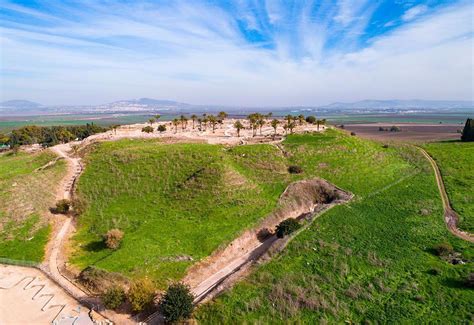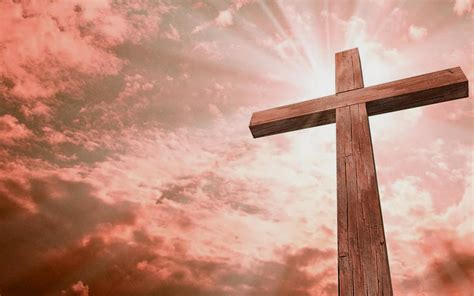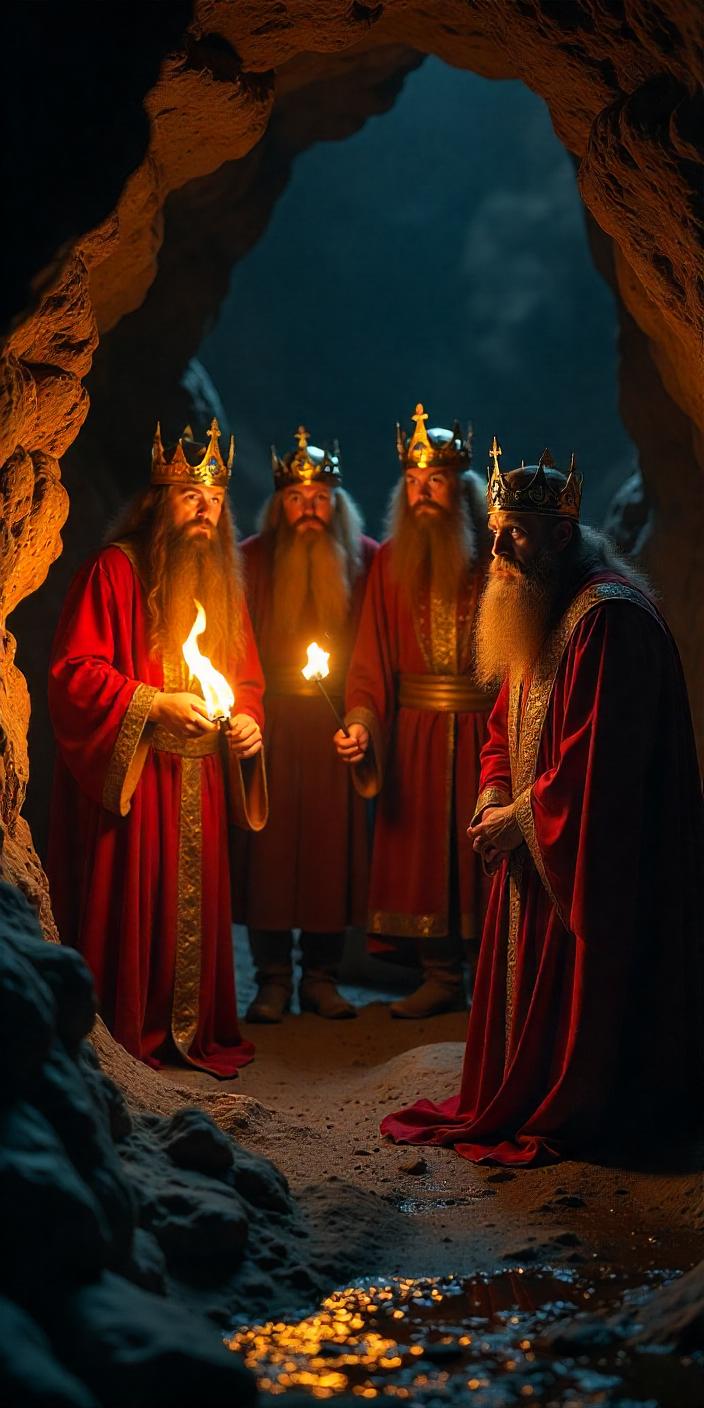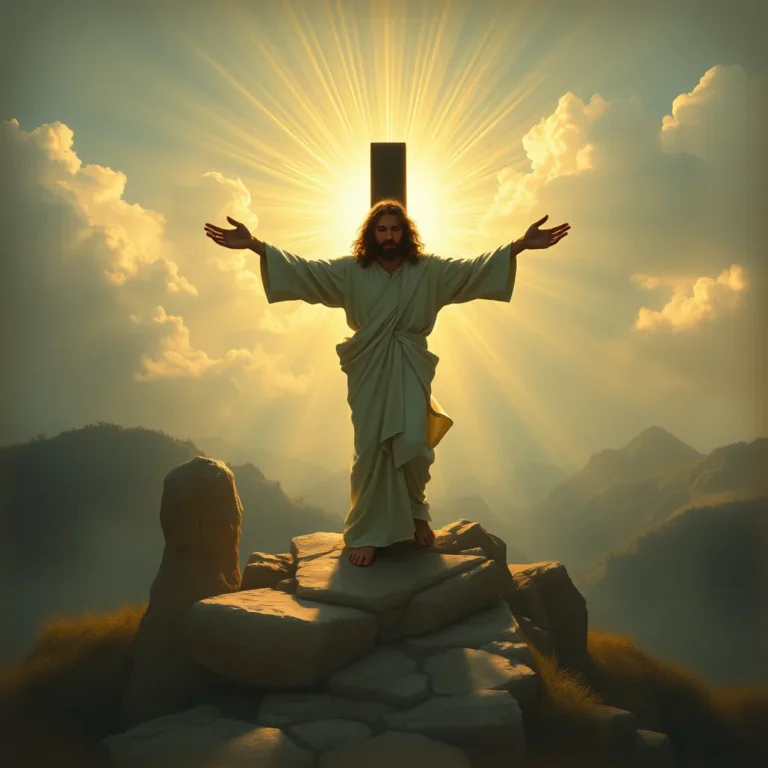
(*Verses are from the NIV unless otherwise noted)
Chapter 16
16 Then they gathered the kings together to the place that in Hebrew is called Armageddon.
17 The seventh angel poured out his bowl into the air, and out of the temple came a loud voice from the throne, saying, “It is done!”
18 Then there came flashes of lightning, rumblings, peals of thunder and a severe earthquake. No earthquake like it has ever occurred since mankind has been on earth, so tremendous was the quake.
19 The great city split into three parts, and the cities of the nations collapsed. God remembered Babylon the Great and gave her the cup filled with the wine of the fury of his wrath.
20 Every island fled away and the mountains could not be found.
21 From the sky huge hailstones, each weighing about a hundred pounds,1 fell on people. And they cursed God on account of the plague of hail, because the plague was so terrible.
Rev 16:16
Then they gathered the kings together to the place that in Hebrew is called Armageddon:
The Greek name Armageddon comes from the Hebrewֹ Har Məgīddō, “Tell of the Governor”1.
A “tell” is a mound or hill created by many generations living and rebuilding at the same spot. This one is an archaeological site that unearthed the ancient city of Megiddo. The area is located in northern Israel, about 30 km (18 miles) southeast of Haifa.

Excavations at Megiddo have unearthed at least 26 layers of ruins since the Copper Age2. The area has been important throughout history for its strategic location at a pass through the Carmel Mountain range in northern Israel. The range stretches from the Mediterranean Sea towards the southeast and was an important trade route between Egypt and Mesopotamia.
The pass was also a corridor into Israel for invading armies and was well known for the many battles fought there between the Israelites and their enemies. The Megiddo Pass could be the site of a cataclysmic end-time battle, but its spiritual significance runs deeper. Just as “Egypt” and “Babylon” are symbols of Israel’s slavery and corruption, “Megiddo” has become a symbol of Satan’s relentless war on humankind, a war he cannot win!
- When Herod heard of a new “king” being born, Satan stirred up Herod’s paranoia, and all boys two years old and under in the area of Bethlehem were murdered (Matt 2:16). But God carried Jesus and his family to safety in Egypt. Satan lost!
- The Enemy tried to tempt Jesus by playing to the common human weakness of self-gratification, greed, and pride. Satan lost (Luke 4:1-13, Matt 4:1-11)!
- When Jesus was killed and then resurrected, Satan lost his greatest gambit of all – his bid to enslave humankind for eternity failed!
- Every time believers stand their ground in determined faith, the forces of evil lose!
The Armageddon scenario plays out repeatedly, but the outcome will always be the same: Christ is triumphant! Faith prevails! Good overcomes evil!
Rev 16:17
The seventh angel poured out his bowl into the air, and out of the temple came a loud voice from the throne, saying, “It is done!”

The breaking of the seven seals and the sounding of the seven trumpets have illustrated twice the consequences of denying God and His Christ. The pouring out of the bowls demonstrates those calamities once again, and the contents of the seventh bowl represent a true finality. “It is done!” John could not possibly forget a similar anguished cry – “It is finished!”
John 19:30 When he had received the drink, Jesus said, “It is finished.” With that, he bowed his head and gave up his spirit.
For centuries Christians have longed for the day that the madness and destruction that seem rampant in the world would come to an end. This declaration from the throne of God is a promise that God will not tolerate humanity’s insanity forever – there will come an end. How and when it will come is a truth held in the wisdom and will of God.
Rev 16:18
Then there came flashes of lightning, rumblings, peals of thunder:
As we’ve seen, these breathtaking natural marvels have long been used to represent the grandeur and omnipotence of God:
Rev 4:5 From the throne came flashes of lightning, rumblings and peals of thunder…
Rev 8:5 Then the angel took the censer, filled it with fire from the altar, and hurled it on the earth; and there came peals of thunder, rumblings, flashes of lightning and an earthquake.
Rev 11:19 Then God’s temple in heaven was opened, and within his temple was seen the ark of his covenant. And there came flashes of lightning, rumblings, peals of thunder, an earthquake and a severe hailstorm.
Rev 16:18
And a severe earthquake. No earthquake like it has ever occurred since mankind has been on earth:
John witnesses an earthquake several times in the revelation, illustrating the moving and shaking of rulers and kingdoms3. But this earthquake is identified as one like none other! Remove this phrase from its literal moorings and the constraints of time as we measure it, and consider its declaration as an eternal principle expressed by the writer of Hebrews:
Heb 12:22 But you have come to Mount Zion, to the city of the living God, the heavenly Jerusalem. You have come to thousands upon thousands of angels in joyful assembly, 23 to the church of the firstborn, whose names are written in heaven. You have come to God, the Judge of all, to the spirits of the righteous made perfect, 24 to Jesus the mediator of a new covenant, and to the sprinkled blood that speaks a better word than the blood of Abel. 25 See to it that you do not refuse him who speaks. If they did not escape when they refused him who warned them on earth, how much less will we, if we turn away from him who warns us from heaven? 26 At that time his voice shook the earth, but now he has promised, “Once more I will shake not only the earth but also the heavens.” 27 The words “once more” indicate the removing of what can be shaken—that is, created things—so that what cannot be shaken may remain. 28 Therefore, since we are receiving a kingdom that cannot be shaken, let us be thankful, and so worship God acceptably with reverence and awe, 29 for our “God is a consuming fire.”
The one event that has shaken, and continues to shake, the world more than any other is the advent of Jesus Christ and the finished work of redemption he accomplished on the cross!

Rev 16:19
The great city split into three parts, and the cities of the nations collapsed:
Some understand the “great city” to be Babylon, the symbol of oppression and slavery:
Rev 14:8 A second angel followed and said, “ ‘Fallen! Fallen is Babylon the Great,’ which made all the nations drink the maddening wine of her adulteries.”
Others contend that it refers to Jerusalem, a symbol of the rejection of Jesus and the Gospel message:
Rev 11:8 Their bodies will lie in the public square of the great city—which is figuratively called Sodom and Egypt—where also their Lord was crucified.
In either case, the significance of the division of the great city into three parts (the number three is a symbol of completeness) and the collapse of the nations is indicative of the total destruction of all things in opposition to God.
Sodom, Egypt, and Babylon have been seen as symbols of licentiousness, idolatry, and captivity. In a literal sense, Rome epitomized all three, and Jerusalem’s leaders had become so focused on the Torah Law as their route to salvation that it became a form of idolatry in and of itself, to the extent that they rejected the very fulfillment of that law, Jesus.
Compare the imagery of verse 19 to Ezekiel’s prophecy against the idolatry of Israel and Josephus’ account of the fall of Jerusalem to the Romans:
Ezek 5:9 Because of all your detestable idols, I will do to you what I have never done before and will never do again. 10 Therefore in your midst parents will eat their children, and children will eat their parents. I will inflict punishment on you and will scatter all your survivors to the winds. 11 Therefore as surely as I live, declares the Sovereign LORD, because you have defiled my sanctuary with all your vile images and detestable practices, I myself will shave you; I will not look on you with pity or spare you. 12 A third of your people will die of the plague or perish by famine inside you; a third will fall by the sword outside your walls; and a third I will scatter to the winds and pursue with drawn sword. 13 “Then my anger will cease and my wrath against them will subside, and I will be avenged. And when I have spent my wrath on them, they will know that I the LORD have spoken in my zeal.
Josephus, War of the Jews, Book 6, 9:3
Now the number of those that were carried captive during this whole war was collected to be ninety-seven thousand; as was the number of those that perished during the whole siege eleven hundred thousand, the greater part of whom were indeed of the same nation [with the citizens of Jerusalem], but not belonging to the city itself; for they were come up from all the country to the feast of unleavened bread, and were on a sudden shut up by an army, which, at the very first, occasioned so great a strait among them, that there came a pestilential destruction upon them, and soon afterward such a famine, as destroyed them more suddenly.
Preterists see the fall of Jerusalem in 70 AD and the collapse of the classic Roman Empire in 456 AD as literal fulfillments of Rev 16:19. But consider the eternal principles being expressed:
- On a personal level, things we hold as most important – money, career, prestige – become idols we “worship” (serve) and lead to the collapse of solid spiritual foundations and the eventual corruption of our souls;
- On a community or national level, the pursuit of power and the neglect of justice always result in misery and the exploitation of the powerless.
Isa 10:1 Woe to those who make unjust laws, to those who issue oppressive decrees, 2 to deprive the poor of their rights and withhold justice from the oppressed of my people, making widows their prey and robbing the fatherless.
Amos 9:9-10 “For I will give the command, and I will shake the people of Israel among all the nations as grain is shaken in a sieve, and not a pebble will reach the ground. 10 All the sinners among my people will die by the sword, all those who say, ‘Disaster will not overtake or meet us.’
Rev 16:20
Every island fled away and the mountains could not be found:
These phrases are hyperboles for the absolute chaos brought to Satan’s seat of power and everything associated with it.

Rev 6:15 Then the kings of the earth, the princes, the generals, the rich, the mighty, and everyone else, both slave and free, hid in caves and among the rocks of the mountains.
Ezek 28:26 They will live there in safety and will build houses and plant vineyards; they will live in safety when I inflict punishment on all their neighbors who maligned them. Then they will know that I am the LORD their God.’ ”
Micah 1:2 Hear, you peoples, all of you, listen, earth and all who live in it, that the Sovereign LORD may bear witness against you, the Lord from his holy temple. 3 Look! The LORD is coming from his dwelling place; he comes down and treads on the heights of the earth. 4 The mountains melt beneath him and the valleys split apart, like wax before the fire, like water rushing down a slope.
In this portrayal of God’s judgment, every false refuge disappears – the mountains, rocks, and islands can’t hide the wicked.
Rev 16:21
From the sky, huge hailstones, each weighing about a hundred pounds, fell on people. And they cursed God on account of the plague of hail, because the plague was so terrible:
Isa 30:30 The LORD will cause people to hear his majestic voice and will make them see his arm coming down with raging anger and consuming fire, with cloudburst, thunderstorm and hail.
Ezek 38:22 I will execute judgment on him with plague and bloodshed; I will pour down torrents of rain, hailstones and burning sulfur on him and on his troops and on the many nations with him.
Historically, Egypt, Assyria, Babylon, Israel, and Rome consistently reacted to the “pouring out of the bowls” by deeper rebellion and blasphemy. John’s vision was clear; Christ would be victorious; His enemies would be overcome! The doom of those who hate truth, Jew and gentile alike, was imminent. By attacking the Church of Christ, both Rome and Jerusalem had set in motion circumstances that would end in their own destruction. The collapse of wealth and influence is a crushing weight to those who depend on material gain for security.
Spiritually, those who abuse others, kill, maim, rape, and destroy, will themselves suffer the misery they perpetrate on others.
Footnotes
- Biblical Hermeneutics What is the meaning of the word ‘Armageddon’ in Revelation 16:16? ↩︎
- Haaretz: Armageddon Time: How Discoveries at Megiddo Retell the Story of Ancient Israel,
https://www.haaretz.com/archaeology/2023-01-22/ty-article-magazine/armageddon-time-how-discoveries-at-megiddo-retell-the-story-of-ancient-israel/00000185-d960-d2d9-ab95-ffe0729e0000, accessed September 3, 2023. ↩︎ - Rev 6:12, 8:5, 11:13, 11:19, 16:18. ↩︎
*All Scripture quotations, unless otherwise indicated, are taken from the Holy Bible, New International Version®, NIV®. Copyright ©1973, 1978, 1984, 2011 by Biblica, Inc.™ Used by permission of Zondervan. All rights reserved worldwide. www.zondervan.comThe “NIV” and “New International Version” are trademarks registered in the United States Patent and Trademark Office by Biblica, Inc.™





